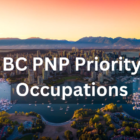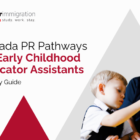The Canadian government requires sponsors to meet minimum income levels to prove they can financially support their partners without needing government help. However, misunderstandings about minimum income rules, documentation, and exemptions often lead to delays or rejections.
In this article, we will understand exactly when income matters, what documents work, and how to avoid the most common refusal reasons while sponsoring your spouse in Canada.
Who Can Sponsor a Spouse in Canada?
To sponsor your spouse, partner, or dependent child, you must:
- Be 18+ years old
- Be a Canadian citizen, permanent resident, or registered under the Indian Act.
- Live in Canada (or prove intent to return if you’re a citizen living abroad)
- Not rely on social assistance (except for disability)
- Prove financial ability to support your family members
Here are some exceptions to these requirements:
- Citizens Outside Canada: Must show plans to return to Canada when the sponsored person becomes a PR.
- Permanent residents: Cannot sponsor if living outside Canada.
Who Cannot Sponsor?
You’re ineligible to sponsor a spouse in Canada if you:
- Are under 18 or a temporary resident (visitor/student/worker)
- Have unresolved immigration applications or obligations
- Failed to repay immigration loans, court-ordered support, or previous sponsorship debts
- Have a criminal record involving violence, sexual offences, or crimes against family members
- Sponsored by a spouse/partner within the last 5 years.
- Are still financially responsible for a previously sponsored spouse/partner.
- Are incarcerated or under a removal order
Financial Requirements for Sponsoring a Spouse
Canada’s spousal sponsorship program prioritizes family reunification, but you must prove that you can financially support:
- Yourself
- Your spouse or partner
- Any dependent children of your spouse or partner
- Your own dependent children
1. Minimum Income Requirements
There is no Minimum Necessary Income (MNI) requirement if you sponsor only your spouse, partner or dependent child. There are certain scenarios where you need to meet minimum income requirements, including:
- Your spouse has a dependent child who also has children
- Example: You + spouse + their grandchild = MNI applies
- You’re sponsoring a dependent child who has their own child
- Example: If you have a dependent child and two grandchildren, you must show an annual income of at least $66,466 for the 2024 intake.
- If you don’t meet the income requirements alone, you can combine your income with your spouse or common-law partner by co-signing your application.
Minimum Necessary Income Requirements (If applicable)
| Family size | 2023 | 2022 | 2021 |
|---|---|---|---|
| 2 people | $44,530 | $43,082 | $32,898 |
| 3 people | $54,743 | $52,965 | $40,444 |
| 4 people | $66,466 | $64,306 | $49,106 |
| 5 people | $75,384 | $72,935 | $55,694 |
| 6 people | $85,020 | $82,259 | $62,814 |
| 7 people | $94,658 | $91,582 | $69,934 |
| If more than 7 people, for each additional person, add: |
$9,636 | $9,324 | $7,120 |
Case Study: Amir (Toronto) earned 48,000 CAD annually but was refused because his wife’s 16-year-old daughter had a baby. Their family size became four, requiring $66,466.
2. Undertaking Commitment While Spousal Sponsorship in Canada
Apart from the Minimum Necessary Income, you are required to sign an undertaking agreement when sponsoring your spouse or partner for permanent residency in Canada. This is a legal commitment to financially support them and their dependent children (if any). It showcases that they do not require government financial assistance during the undertaking period. You must:
- Provide essentials for daily living: Food, clothing, accommodation, and other necessities.
- Uncovered health services: dental care, eye care, and other medical needs, are not covered by public health insurance.
- Support your spouse or partner without them relying on public assistance.
- Understand that if they receive financial help from the government, you will be required to repay the full amount provided during the undertaking period.
Important: Failure to repay the amount will prevent you from sponsoring anyone else in the future until the debt is settled.
Previous Sponsorship Undertakings
If family members you sponsored in the past received social assistance while your previous undertaking was active, you are barred from sponsoring again until:
- You repay the full amount of the social assistance they received, or
- You clear the debt with the government authority that provides the financial assistance.
Binding Nature of the Agreement
The undertaking is legally binding and stays in effect for its entire duration, even if your circumstances change. For example, the agreement remains valid if:
- The sponsored individual becomes a Canadian citizen.
- You divorce, separate, or your relationship ends.
- Either of you moves to another province or even out of the country.
- You experience financial difficulties
Duration of the Undertaking
- For a spouse or partner: 3 years from the date they become a permanent resident.
- For dependent children over 22 years old: 3 years from the date they become permanent residents.
- For dependent children under 22 years old: Up to 10 years or until they turn 25, whichever comes first.
(Note: Quebec residents have different requirements.)
Can You Cancel the Undertaking?
It’s possible to withdraw your sponsorship and undertaking before a final decision is made on the application. To do this, you must write a letter requesting the withdrawal and submit it via the IRCC Webform. However, you cannot cancel the undertaking agreement once the sponsorship is approved.
Sponsor Your Spouse in Canada
Start your spousal sponsorship application with our Licensed Experts.
Key Financial Documentation for Spousal Sponsorship
IRCC requires thorough proof of your financial stability. Submitting incomplete or outdated documents is a leading cause of refusal. Here’s what you need:
- Notice of Assessment (NOA): Provide your most recent NOA from the Canada Revenue
Agency (CRA) to verify your income. - Employment Letters: A letter from your employer confirming your job title, salary, and
permanent status. Freelancers or self-employed individuals should submit contracts,
invoices, and bank statements. - Proof of Government Benefits: If applicable, include documentation for EI, CPP, or
disability payments.
Note: If you’re unemployed, you can use assets like savings, investments, or property to showcase financial capacity. However, IRCC scrutinizes non-income sources closely.
Common Mistakes Leading to Refusal
There are several common mistakes as well that applicants may make, which may lead to
refusal. These generally include:
Assuming MNI Doesn’t Apply to You
Many sponsors believe MNI exemptions apply universally. However, you must meet the LICO-based income threshold if your spouse has dependent children (e.g., from a previous relationship). One refusal reason states:
“You have not demonstrated that you meet the minimum income requirement to sponsor all family members.”
For this, you need to calculate your total family size (including dependents) and cross-reference it with the latest LICO table.
2. Relying on Co-Signers
Co-signers (e.g., a parent) can help meet MNI requirements, but they must:
- Be a Canadian citizen or permanent resident.
- Reside in Canada.
- Agree to share financial responsibility for your spouse.
Having said that, it is important to note that co-signers with poor credit history or outstanding
social assistance debts will disqualify your application.
3. Ignoring Provincial Differences
Quebec has its own sponsorship rules, including higher income thresholds. For example, a Quebec sponsor with a spouse and one child must earn at least $47,585 annually (vs. $44,530 federally).
In light of these, there are several ways to strengthen your application as well, as discussed below.
How to Build a Strong Financial Profile for Sponsorship
A successful application hinges on demonstrating consistent and reliable financial stability. Here’s how to position your case for approval:
1. Proactive Financial Preparation
Start compiling financial evidence well in advance—at least six months prior to applying. Immigration officials prioritize stability over temporary gains. To present a robust financial profile:
- For Employees: Obtain a letter from your employer confirming your permanent position and salary. Include recent pay stubs and tax documents as additional proof of steady income.
- For Self-Employed or Freelancers: Submit audited financial statements for the past two years, along with client contracts and bank records showing consistent deposits.
- For Those Relying on Savings: Provide six months of detailed bank statements and attach a sworn affidavit explaining how these savings will cover your spouse’s needs during the sponsorship period.
- If you’ve recently switched jobs, be sure to include your employment contract and a cover letter explaining the transition.
2. Addressing Employment Gaps
Unexplained gaps in employment history can raise concerns, so it’s important to address them proactively. If you’ve taken a break for caregiving, education, or other reasons:
- Write a detailed cover letter outlining the circumstances.
- Include supporting evidence, such as savings records, rental income documentation, or spousal support payments.
For example, someone who paused their career to care for an elderly parent could provide bank statements showing $30,000 in savings and a letter from their spouse’s overseas employer confirming future financial contributions.
3. Professional Guidance
Working with an immigration consultant can help you identify potential weaknesses in your financial profile. A consultant can assist in putting together a personalized explanation letter to address irregular income or unconventional assets, such as cryptocurrency holdings or foreign property.
Need help?
At ELAAR Immigration, we specialize in spousal sponsorship applications. From compiling airtight financial evidence to addressing gaps in employment history, our team ensures your application meets IRCC’s strict standards. We’ll guide you through every requirement, including demonstrating your financial stability, completing the undertaking agreement, and providing accurate supporting documents. Let us help you reunite with your spouse in Canada!
You can contact our experts today to get started on your Canada visa application.









